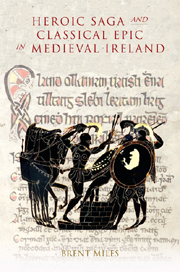Book contents
- Frontmatter
- Contents
- Acknowledgements
- Note on Texts and Editions
- Abbreviations
- Introduction: Figmenta Poetica and Heroic Saga
- 1 Classical Learning in Medieval Ireland: The State of the Question
- 2 The Irish Classical Tales: Texts and Sources
- 3 Classicism and Togail Troí
- 4 Táin Bó Cúailnge and Latin Epic
- 5 The Rhetorical Set Piece and the Breslech of the Plain of Murthemne
- Afterword: An Invitation to Study
- Bibliography
- Index
- STUDIES IN CELTIC HISTORY
Introduction: Figmenta Poetica and Heroic Saga
Published online by Cambridge University Press: 12 September 2012
- Frontmatter
- Contents
- Acknowledgements
- Note on Texts and Editions
- Abbreviations
- Introduction: Figmenta Poetica and Heroic Saga
- 1 Classical Learning in Medieval Ireland: The State of the Question
- 2 The Irish Classical Tales: Texts and Sources
- 3 Classicism and Togail Troí
- 4 Táin Bó Cúailnge and Latin Epic
- 5 The Rhetorical Set Piece and the Breslech of the Plain of Murthemne
- Afterword: An Invitation to Study
- Bibliography
- Index
- STUDIES IN CELTIC HISTORY
Summary
Táin Bó Cúailnge, ‘The Cattle-raid of Cooley’, is a long prose tale from Christian medieval ireland, in which are recounted the deeds of Iron Age kings and heroes from Ireland's pre-Christian past. The text is a sophisticated recreation of pre-history from the point of view of a society that had been literate in both Latin and its own vernacular, Irish, for centuries. Based ultimately on history that could be traced in oral tradition back to before the coming of Christianity, the Táin may have emerged as a written text as early as the seventh century. However, the written text grew and changed over time, and different versions survive today. The earliest complete surviving version was written sometime in the eleventh or twelfth century and is preserved in the twelfth-century vellum codex today called the Book of Leinster. At the text's conclusion, there are two colophons, one in Irish, and one, unusually, in Latin:
Bendacht ar cech óen mebraigfes go hindraic Táin amlaid seo 7 ná tuillfe cruth aile furri.
Sed ego qui scripsi hanc historiam aut uerius fabulam quibusdam fidem in hac historia aut fabula non accommodo. Quaedam enim ibi sunt praestrigia demonum, quaedam autem figmenta poetica, quaedam similia uero, quaedam non, quaedam ad delectationem stultorum.
(Irish) A blessing on every one who will study/learn the Táin faithfully in this way and who will not add any other form to it.
(Latin) But I who wrote this historia, or rather fabula, do not give credence to certain things in this historia or fabula.
- Type
- Chapter
- Information
- Heroic Saga and Classical Epic in Medieval Ireland , pp. 1 - 14Publisher: Boydell & BrewerPrint publication year: 2011



